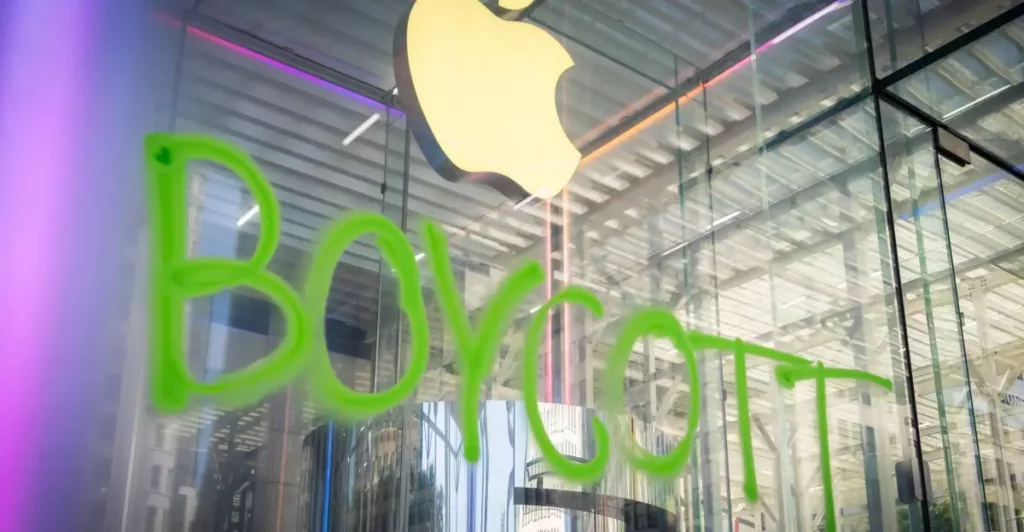In today’s world of corporate diplomacy, technology giants project an image of unwavering commitment to environmental sustainability. Public declarations by companies like Apple, Google, and Microsoft paint a picture of innovation aligned with climate justice. Yet beneath this polished facade lies a harrowing inconsistency—a strategic PR stunt designed more for brand preservation than genuine change. The tendency to conflate publicity with impactful action demonstrates a profound disconnect, revealing that many of these corporations treat environmental responsibility as a secondary concern, secondary only to their market interests. Far too often, their narratives veer toward superficiality, offering consumers a comforting illusion that technological progress and ecological health can coexist when, in reality, their actions bark far louder than their green claims.
Corporate Hypocrisy Vs. Genuine Commitment
A recent protest at Apple’s flagship store in New York encapsulates this glaring hypocrisy. Activists associated with Extinction Rebellion defaced the storefront, not out of vandalism but as a deliberate statement—exposing the chasm between corporate rhetoric and reality. The message was clear: despite their vows to combat climate change, corporate leaders often prioritize political alliances that weaken environmental protections. For example, many tech CEOs continue to funnel money into political campaigns and lobby efforts that oppose the regulations they publicly endorse. This duality isn’t accidental. It underscores an opportunistic approach where climate pledges serve as a shield, deflecting scrutiny while corporations perpetuate policies that undermine the very goals they claim to pursue.
The Dangerous Acceleration of Environmental Impact through Innovation
The push for technological advancement—particularly in artificial intelligence and data infrastructure—introduces a sobering twist to the narrative. While progress in AI promises efficiency and innovation, the energy required to sustain these systems skyrockets. Google’s expanding data centers and Microsoft’s investments in AI research exemplify ambitions without adequate regard for environmental costs. Despite glossy sustainability reports, the hidden truth is that these innovations escalate energy consumption, thus deepening the carbon footprint. This paradox reveals a troubling pattern: the more these corporations innovate, the more they potentially compromise ecological stability, all while marketing their efforts as forward-thinking and eco-friendly.
The Irony of Lobbying and Political Engagement
Corporate influence on policy is a defining weapon in their greenwashing arsenal. Leaders like Tim Cook are celebrated for environmental advocacy—yet their political support often contradicts their public message. When Apple supports or remains silent on legislation geared toward dismantling environmental protections, their integrity is compromised. It’s a disturbing irony that these companies, which claim to champion sustainability, often bankroll or support political figures who roll back environmental regulations. This not only undermines the progress they claim to support but also beguiles consumers into believing their commitments are authentic, when in truth, they are engaged in subtle but effective lobbying campaigns that weaken long-term ecological health.
The Role of Greenwashing in Contemporary Business Practices
Greenwashing is a strategy perfected by major corporations to capitalize on consumer concern for the environment. It allows these companies to trade on environmental guilt without risking significant operational reform. By investing in token sustainability initiatives or promoting vague promises, they seek to enhance their brand reputation while continuing to operate in ways that are often environmentally harmful. This practice breeds a false sense of progress—consumers are led to believe that purchasing from such brands is inherently eco-friendly, a perception that ultimately dilutes genuine sustainability efforts and stalls critical systemic change.
The Broader Societal Implication: Losing Trust in Power
This widespread disconnect has repercussions beyond the corporate sphere. Society’s trust erodes as the public realizes that many of these tech giants are merely navigating the optics of sustainability instead of implementing concrete policies. Moreover, their influence over political decisions stifles meaningful progress. If corporations continue to prioritize market dominance and political favors over ecological stewardship, the environmental deterioration will accelerate, with little true accountability. The recent protest acts as a wake-up call—public outrage and activism are vital, but a fundamental overhaul of corporate priorities and transparency is essential for any sustainable future.
Can Public Pressure Force Authentic Change?
Ultimately, the question lingers: will corporations be compelled by protests and consumer activism to evolve beyond superficial commitments? The current dynamic suggests that unless there’s sustained pressure—regulation, transparency, and accountability—these companies will continue their dance of greenwashing, maintaining an appearance of progress while actively undermining environmental goals. Genuine change requires an overhaul of how these corporations operate, not just superficial marketing campaigns. The onus lies on the public and policymakers to hold them accountable, forcing corporate leaders to walk the walk rather than just talk the talk. Without this, the environmental costs of technological progress will remain hidden behind a carefully constructed veneer of responsibility and innovation.









Leave a Reply